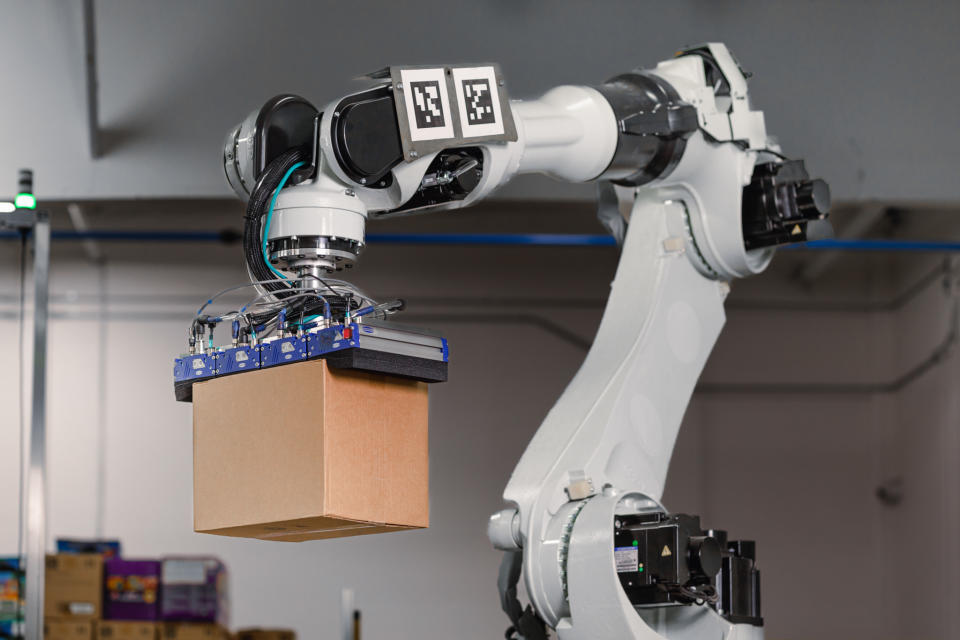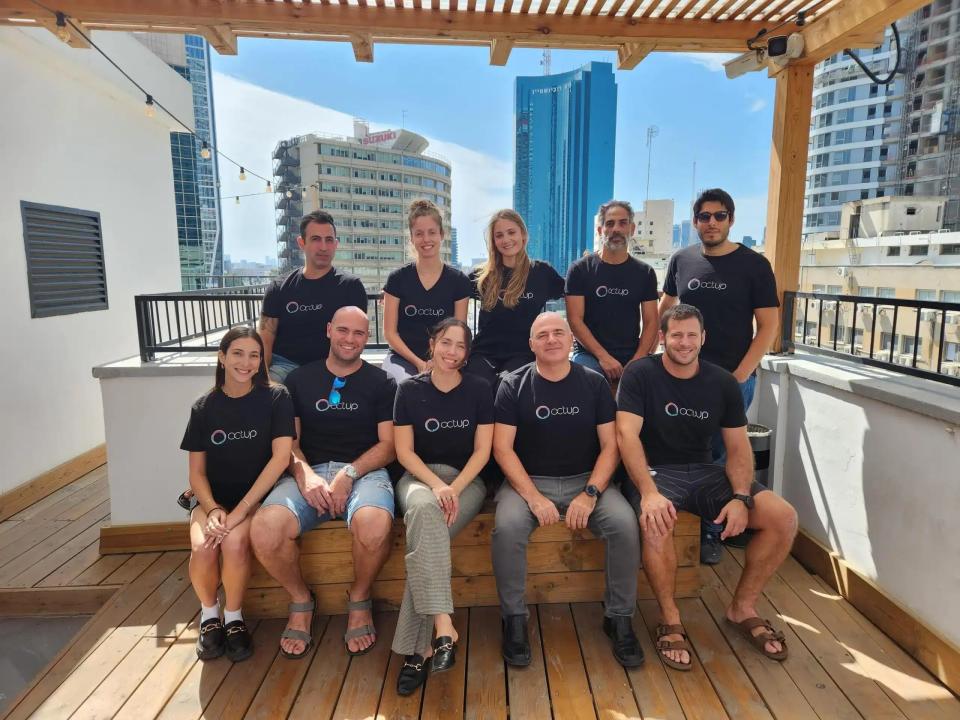Byte-Sized AI: GXO’s Warehouse Robots; Dollar General’s Inventory Partnership

Byte-Sized AI is a bi-weekly column that covers all things artificial intelligence—from startup funding, to newly inked partnerships, to just-launched, AI-powered capabilities from major retailers, software providers and supply chain players.
GXO amps use of robotics
Logistics provider GXO announced a partnership with Dexterity, a California robotics developer. The two companies will run a pilot program for AI-boosted robots that can aid warehouse operations.
More from Sourcing Journal
The partnership will work to optimize efficient operations for “a leading beauty brand,” per a release from the company. However, the robots being used for the pilot have the capability to be deployed for use in a number of industries.
Adrian Stoch, chief automation officer at GXO, said the collaboration will save time for customers, enabling them to shift their attention to strategic priorities within their organizations.
“We’re leading the charge on integrating automation into our customers’ supply chains to help them grow and meet their strategic objectives,” Stoch said. “This pilot is especially exciting as it combines advanced robotics with artificial intelligence and machine learning into a practical application to make warehouse operations safer, more productive and more efficient.”
Per the release, the robots will depalletize, label and repalletize packages to enhance the efficiency of both inbound and outbound processes. Because the robots operate via AI systems, they improve with each task they complete and train themselves further as they operate.
Since robots are less prone to error than humans, implementing them into warehouses is expected to catalyze an increase in safe warehouses, per the company.

Startup uses AI to connect retailers with secondary buyers
Vendidit, a software platform that will use AI to facilitate transactions between retailers and secondary market buyers, has revealed its launch.
The new technology could help with one of retailers’ most pressing problems: returns. Per Optoro, returns cause about 9.5 billion pounds of landfill waste every year. According to John Paul DeJoria, an investor in Vendidit, the just-launched startup will help businesses mitigate the frenzy of returned goods, ensuring fewer goods are ultimately routed to landfills.
“Unfortunately, returned items often languish on shelves or end up in landfills due to the absence of a more efficient system for connecting buyers and sellers in the aftermarket—a gap that Vendidit will fill. It is not only an enormous business opportunity; it is truly doing good for the planet,” said John Paul DeJoria, a prominent businessman who invested in the startup.
In a release, the startup noted that the once-lengthy process of connecting buyers and sellers can now be done in just a few seconds.
“The reverse logistics industry has been in the dark ages of technology, and now Vendidit will change the game by bringing AI into the retail returns industry. It matches retailers, desperate to move returns out, with secondary buyers desperate for inventory—in seconds,” said Gary Stephens’, Vendidit’s co-founder and CEO.
E-commerce insights startup grabs $4M in pre-seed
Octup has secured $4 million in pre-seed funding led by Tal Ventures, with support from Bullet Ventures, HCS Investors Group, World Trade Ventures and angel investors. Tal Ventures invested over $2 million in a previous pre-seed round.
The Tel Aviv-based company gathers and processes data from various parts of a business, like last-mile delivery, customer interactions, warehousing and more to surface trends, outliers and significant data points. The patterns and issues it identifies helps businesses to course correct on cost inefficiencies.
Alon Partuk, the founder and CEO of Octup, said the startup aims to go beyond the surface level with technology.
“In creating Octup, our goal was to tap into deeper operational insights beyond standard metrics to uncover real opportunities,” Partuk said in a statement. “Our dedicated team tackled technical and data complexity challenges head-on, developing an advanced engine to access previously elusive information. This innovation now provides complete operational visibility, revealing hidden costs and delivering significant value to our clients.”
The company will use its newfound funding to “broaden the rollout of its 360-degree end-to-end discovery platform,” per a release.
Coalatree, an outdoor apparel company that is one of Octup’s clients, said the platform has helped it to rectify issues with disorganized, disconnected data silos and insights. Since partnering with Octup, Coalatree’s president and COO noted, the company has seen a 12 percent reduction in cost per order and a 9 percent increase in revenue growth.

GenPact and ServiceNow Team Up for Sourcing and Supply Chain Tool
GenPact and ServiceNow have expanded their partnership to create a new offering called Source-to-Pay, which leverages ServiceNow’s AI capabilities to make processes more efficient, cut costs and enhance team members’ productivity.
The new tool has applications across sourcing and procurement, supply chain and accounts payable, per a release from the company.
The supply chain functions of the tool will work to strengthen relationships and collaboration with suppliers, while also helping to pinpoint and address inconsistencies and problems quickly. Per GenPact, the companies expect this to create fewer headaches for transactions.
Where sourcing and procurement are concerned, the two companies’ collaboration will consolidate and streamline digital procurement operations for all parties involved: suppliers, buyers and employees.
Erica Volini, senior vice president of global partnerships and channels at ServiceNow, said the technology will put technology at the heart of customers’ day-to-day work.
“The amount of manual offline work involved in finance and supply chain operations makes them prime candidates for digital transformation,” Volini said in a statement. “Genpact’s leadership in this space, combined with the AI-fueled automation power of the ServiceNow Platform, will help ensure our joint customers will get better business results, faster time to value, and increased productivity for their procurement and finance operations.”
Dollar General goes all in on inventory management tech
National discount retailer Dollar General has joined forces with Shelf Engine, a Seattle-based startup, to help optimize its produce ordering processes.
The two companies began pilot testing the technology in several hundred stores in 2022, but by the end of the 2023 fiscal year, the AI-powered system will be incorporated into 3,000 of Dollar General’s stores, per a release.
Shelf Engine’s AI models are designed to create orders for each individual SKU, which could help prevent excess inventory and out-of-stocks for customers.
Allen Warch, vice president, division merchandise manager with leadership of fresh merchandise at Dollar General, said that while the solutions provides value to Dollar General, it also positively benefits customers’ needs, providing them with the freshest possible produce.
“Adopting Shelf Engine’s AI solutions aligns seamlessly with our mission of serving others, helping our teams enhance value and convenience for our customers,” Warch said.
Dollar General isn’t the only retailer developing a technology-backed strategy for better SKU management.
Because excess inventory can create waste and major profit losses in fashion and apparel, a number of companies—like Reformation, Chubbies, Skechers and Dick’s Sporting Goods—have inked partnerships with technology providers to optimize inventory management, pricing and ordering.
Altana expands partnership with UK government
Altana, a company that creates a real-time supply chain map for its customers based on public and non-public data, announced this month that it would expand the scope of its partnership with the UK’s Department of Business and Trade (DBT).
The New York-based startup also counts the U.S.’s Department of Homeland Security (DHS) and Customs and Border Protection (CBP) among its clients.
The partnership will help expand the scope of the UK’s Global Supply Chain Intelligence Program (GSCIP), which helps track the movement of goods and monitor supply chains that affect the UK. Altana began pilot testing with the GSCIP about two years ago. Since the beginning of the tests, Altana’s tool, Atlas, has helped the UK government significantly decrease the time it takes to garner insights on the supply chain while also reducing costs, per a release from the company.
The partnership aims to allow the UK government’s supply chain efforts to become more proactive, and to help them glean insights into alternative routes to overcome blips in the supply chain.
Evan Smith, Altana’s CEO and co-founder, said the partnership brings in cross-agency users to enable smoother work patterns.
“The UK GSCIP is a visionary initiative to build supply chain resilience through a common operating picture between and among UK government agencies and the private sector,” said Smith in a statement. “It is also a groundbreaking use of Altana’s supply chain data and AI platform, with both technical and non-technical users across the government working from and building on our supply chain map.”

